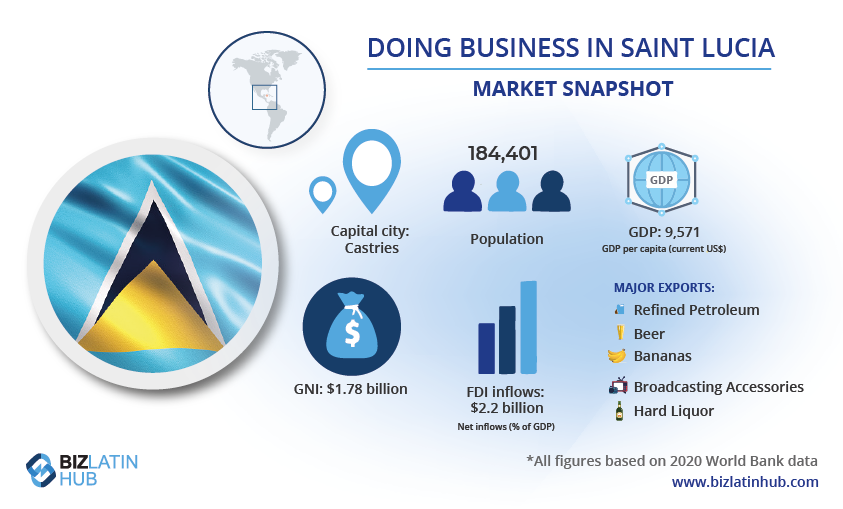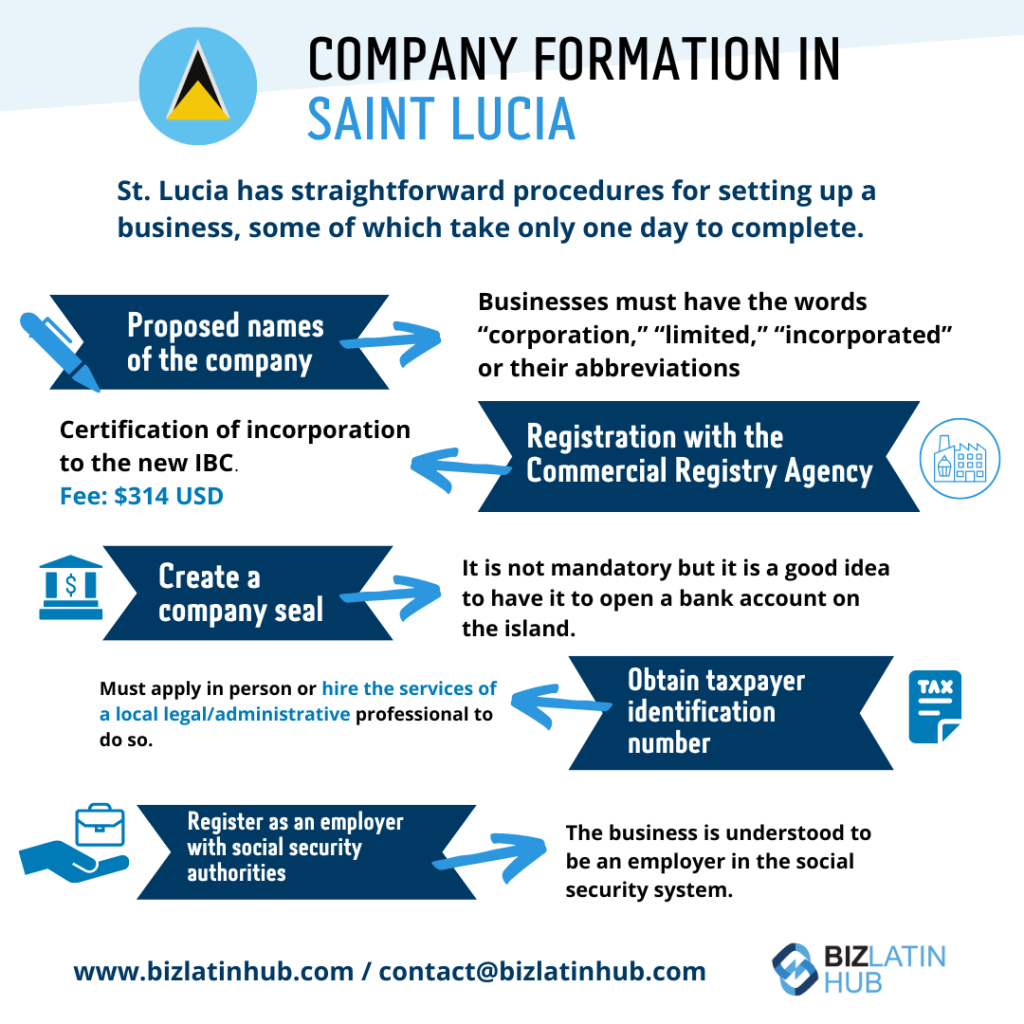Table of Contents
Saint Lucia is a beautiful Caribbean island with idyllic beaches, year-round tropical weather and friendly people, which makes it a popular tourist destination. But it’s also an attractive jurisdiction for foreigners to develop a business. What follows is some useful information for foreign investors and companies who are considering company formation in Saint Lucia.
The most convenient and cost-effective way to go about company formation in Saint Lucia is to follow the regulatory requirements imposed on International Business Companies (IBCs).
Company formation St. Lucia: What is an IBC?
All foreign companies that incorporate in Saint Lucia must comply with the International Business Company (IBC) Act, and are thereafter known as IBCs. Foreign businesses domiciled in Saint Lucia used to enjoy tax exemptions, but that all changed in 2019. Company formation in Saint Lucia, including IBCs, are now taxed at 30 percent on income from locally-sourced business, however, income generated by IBCs abroad is exempt from local taxes. Companies that incorporated before the 2019 amendment to the IBC Act continue to enjoy tax exemptions on Saint Lucia-generated income.
SEE ALSO: Company Formation in Guyana: a 7 Step Guide

Company Formation in Saint Lucia: What are the perks?
In recent years, Saint Lucia has become an attractive Caribbean destination for foreign investment thanks to the multiple benefits offered by the government to encourage IBCs to set up shop on the island. Here are some of the benefits the come from company formation in Saint Lucia:

5 Steps guide to company formation in St. Lucia:
- Name Search
- Registration with the Commercial Registry Agency
- Make company seal
- Obtain taxpayer identification number
- Register as an employer with the social security institute
Below we explore each of these points in more detail:
- Name Search
Company formation in Saint Lucia requires that a business name be registered. A local attorney can conduct a name search. Companies cannot have a name that’s similar to a business that’s already registered on the island. Businesses must have the words “corporation,” “limited,” “incorporated” or their abbreviations in their company name – depending on the type of company they register as. This process can be completed in two days.
- Registration with the Commercial Registry Agency
Registering a company with the Commercial Registry of Saint Lucia must pay a fee of $850 Eastern Caribbean Dollars (XCD), or the equivalent of $314 USD. The Registry will issue a certification of incorporation to the new IBC when all relevant paperwork is submitted. The processing time typically takes one week.
- Create a company seal
The IBC Act does not require IBCs to have a company seal, but it’s a good idea to have one, as opening a business bank account on the island requires that a business has one. It’s also required to make certain kinds of account transactions. Many companies use a rubber stamp as an official signature, while others make a simple seal, which takes about two days.
- Obtain taxpayer identification number
The managing director of the IBC must apply for a tax number in person from the Inland Revenue Department, or the business can hire the services of a local legal/administrative professional to do so on its behalf. The tax identification number (TIN) process takes about one business day.
- Register as an employer with social security authorities
Finally, the business must be registered with the National Insurance Corporation so that the business is understood to be an employer in the social security system. This process takes one day to complete.
Frequently asked questions when incorporating a company in St. Lucia
According to our experience, these are the most common questions and doubts of our Clients when incorporating a company in St. Lucia
Yes, foreigners can own and operate businesses in Saint Lucia. Saint Lucia welcomes foreign investment and offers a relatively open and business-friendly environment for foreign entrepreneurs and investors.
Registering a company in Saint Lucia typically takes around 8-10 weeks, depending on the type of business entity and the completeness of the application.
In Saint Lucia, “IBC” stands for “International Business Company.” An IBC is a type of offshore company designed for international business operations, offering various tax benefits and privacy advantages.
Limited liability is commonly offered through companies, including International Business Companies (IBCs) and domestic companies such as private companies limited by shares.
The main characteristics of an International Business Company (IBC) in Saint Lucia typically include:
– Limited liability for its shareholders.
– Exemption from local taxation.
– Minimal reporting and disclosure requirements.
– Ability to conduct international business activities.
– Flexibility in ownership and management structures.
– Strong confidentiality and privacy protections.
Biz Latin Hub can help you with company formation in St. Lucia
At Biz Latin Hub, our multilingual team of company formation specialists has extensive experience in assisting businesses domicile throughout Latin America and the Caribbean.
We have offices in 17 countries in the region and trusted partners in many more. With our strong track record of providing comprehensive back-office services to foreign investors — including legal, accounting, and recruitment support — we are ready to help you achieve your business goals in Saint Lucia.
Reach out to us now for personalized assistance or a free quote, or read more about market entry from our team and expert authors.

The information provided here within should not be construed as formal guidance or advice. Please consult a professional for your specific situation. Information provided is for informative purposes only and may not capture all pertinent laws, standards, and best practices. The regulatory landscape is continually evolving; information mentioned may be outdated and/or could undergo changes. The interpretations presented are not official. Some sections are based on the interpretations or views of relevant authorities, but we cannot ensure that these perspectives will be supported in all professional settings.



.png#keepProtocol)




.png#keepProtocol)
More Stories
The Key to Boosting Retention
Kim Jong Un Unveils Ambitious ‘Regional Development Policy’ To Modernize Rural North Korea Amid Food Shortages
Industry Leader Revolutionizes Business Financing Through Credit Stacking